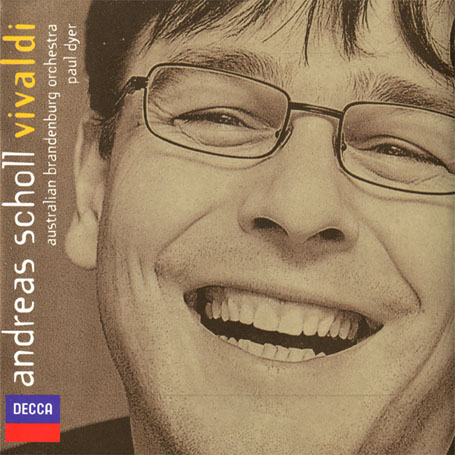Vivaldi Nisi Dominus
Voluptuously packaged, this latest recital by Andreas Scholl conveys many of the irresistible qualities which won him a Gramophone Award for his Vivaldi Stabat mater recording in 1997
View record and artist detailsRecord and Artist Details
Composer or Director: Antonio Vivaldi
Label: Decca
Magazine Review Date: 10/2000
Media Format: CD or Download
Media Runtime: 70
Catalogue Number: 466 964-2OH

Tracks:
| Composition | Artist Credit |
|---|---|
| Nisi Dominus |
Antonio Vivaldi, Composer
Andreas Scholl, Alto Antonio Vivaldi, Composer Australian Brandenburg Orchestra Paul Dyer, Organ Paul Dyer, Harpsichord |
| Salve Regina |
Antonio Vivaldi, Composer
Andreas Scholl, Alto Antonio Vivaldi, Composer Australian Brandenburg Orchestra Paul Dyer, Harpsichord Paul Dyer, Organ |
| Clarae stellae |
Antonio Vivaldi, Composer
Andreas Scholl, Alto Antonio Vivaldi, Composer Australian Brandenburg Orchestra Paul Dyer, Harpsichord Paul Dyer, Organ |
| Vestro Principi divino |
Antonio Vivaldi, Composer
Andreas Scholl, Alto Antonio Vivaldi, Composer Australian Brandenburg Orchestra Paul Dyer, Organ Paul Dyer, Harpsichord |
| Concerto for Strings |
Antonio Vivaldi, Composer
Antonio Vivaldi, Composer Australian Brandenburg Orchestra Paul Dyer, Organ Paul Dyer, Harpsichord |
Author: Jonathan Freeman-Attwood
Since his last Vivaldi disc Scholl has changed record companies, although this new disc conveys the sense of continuity in the work of a composer to which he seems quite naturally drawn. Scholl may not deliver the knife-edge precision or dramatic immediacy of David Daniels, but the honey-dewed legatos, effortless poise and evenness in all registers are in superlative evidence here and eminently suited to Vivaldi’s vocal challenges.
The programme is framed by two striking solo motets which brought out the most inventive spirit in the Venetian: Nisi Dominus is a model of rich and varied imagery – maybe written for a talented girl in the Ospedale della Pieta – reaching its peak in the section, ‘Cum dedent delectis’, which Scholl colours bewitchingly, floating the stellar melody in rapt contemplation. He is hypnotic in ‘for so he giveth his beloved sleep’ and radiantly alert throughout. This work also employs an obbligato viola d’amore on which Vivaldi was a seasoned exponent and pedagogue.
The Australian Brandenburg Orchestra are responsive accompanists, occasionally a touch leaden in articulation (and not just where Vivaldi calls for ‘piombi’, ie lead, mutes in Nisi Dominus) and prosaic in gesture – especially in the two ripieno concertos. Yet they are an impressively full-sounding and polished ensemble, slightly old-fashioned in their gait though relishing an easy, unfussy responsiveness with Scholl, refreshingly realised in one of the two smaller works, Vestro Principi divino, a florid work-out for soloist, which receives exemplary support from the orchestra. Clarae stellae was composed for a foundling called Geltruda, a soloist admired more for her expressivity, one imagines, than her technical aplomb or vocal projection. James Bowman gives us a fine reading for Robert King, though here one feels Scholl responding more acutely to Vivaldi’s sensitive scoring, as the composer judiciously reinforces the solo line with a violin and discretely keeps the register manageable. Scholl’s restraint is sweetly received, as historical context magically informs his artistry.
To cap a fine disc, Salve Regina – another work originally intended for a female – is seductively handled as Vivaldi’s soft-edged instrumentation and Scholl’s spell-binding realisation converge in consolation and the kind of purplish piety which suits Scholl’s fine sense of the ecclesiastical. He is occasionally slightly under the note, which may not bother the majority, but deserves fleeting mention in an otherwise true Vivaldi feast.'
The programme is framed by two striking solo motets which brought out the most inventive spirit in the Venetian: Nisi Dominus is a model of rich and varied imagery – maybe written for a talented girl in the Ospedale della Pieta – reaching its peak in the section, ‘Cum dedent delectis’, which Scholl colours bewitchingly, floating the stellar melody in rapt contemplation. He is hypnotic in ‘for so he giveth his beloved sleep’ and radiantly alert throughout. This work also employs an obbligato viola d’amore on which Vivaldi was a seasoned exponent and pedagogue.
The Australian Brandenburg Orchestra are responsive accompanists, occasionally a touch leaden in articulation (and not just where Vivaldi calls for ‘piombi’, ie lead, mutes in Nisi Dominus) and prosaic in gesture – especially in the two ripieno concertos. Yet they are an impressively full-sounding and polished ensemble, slightly old-fashioned in their gait though relishing an easy, unfussy responsiveness with Scholl, refreshingly realised in one of the two smaller works, Vestro Principi divino, a florid work-out for soloist, which receives exemplary support from the orchestra. Clarae stellae was composed for a foundling called Geltruda, a soloist admired more for her expressivity, one imagines, than her technical aplomb or vocal projection. James Bowman gives us a fine reading for Robert King, though here one feels Scholl responding more acutely to Vivaldi’s sensitive scoring, as the composer judiciously reinforces the solo line with a violin and discretely keeps the register manageable. Scholl’s restraint is sweetly received, as historical context magically informs his artistry.
To cap a fine disc, Salve Regina – another work originally intended for a female – is seductively handled as Vivaldi’s soft-edged instrumentation and Scholl’s spell-binding realisation converge in consolation and the kind of purplish piety which suits Scholl’s fine sense of the ecclesiastical. He is occasionally slightly under the note, which may not bother the majority, but deserves fleeting mention in an otherwise true Vivaldi feast.'
Discover the world's largest classical music catalogue with Presto Music.

Gramophone Digital Club
- Digital Edition
- Digital Archive
- Reviews Database
- Full website access
From £8.75 / month
Subscribe
Gramophone Full Club
- Print Edition
- Digital Edition
- Digital Archive
- Reviews Database
- Full website access
From £11.00 / month
Subscribe
If you are a library, university or other organisation that would be interested in an institutional subscription to Gramophone please click here for further information.




